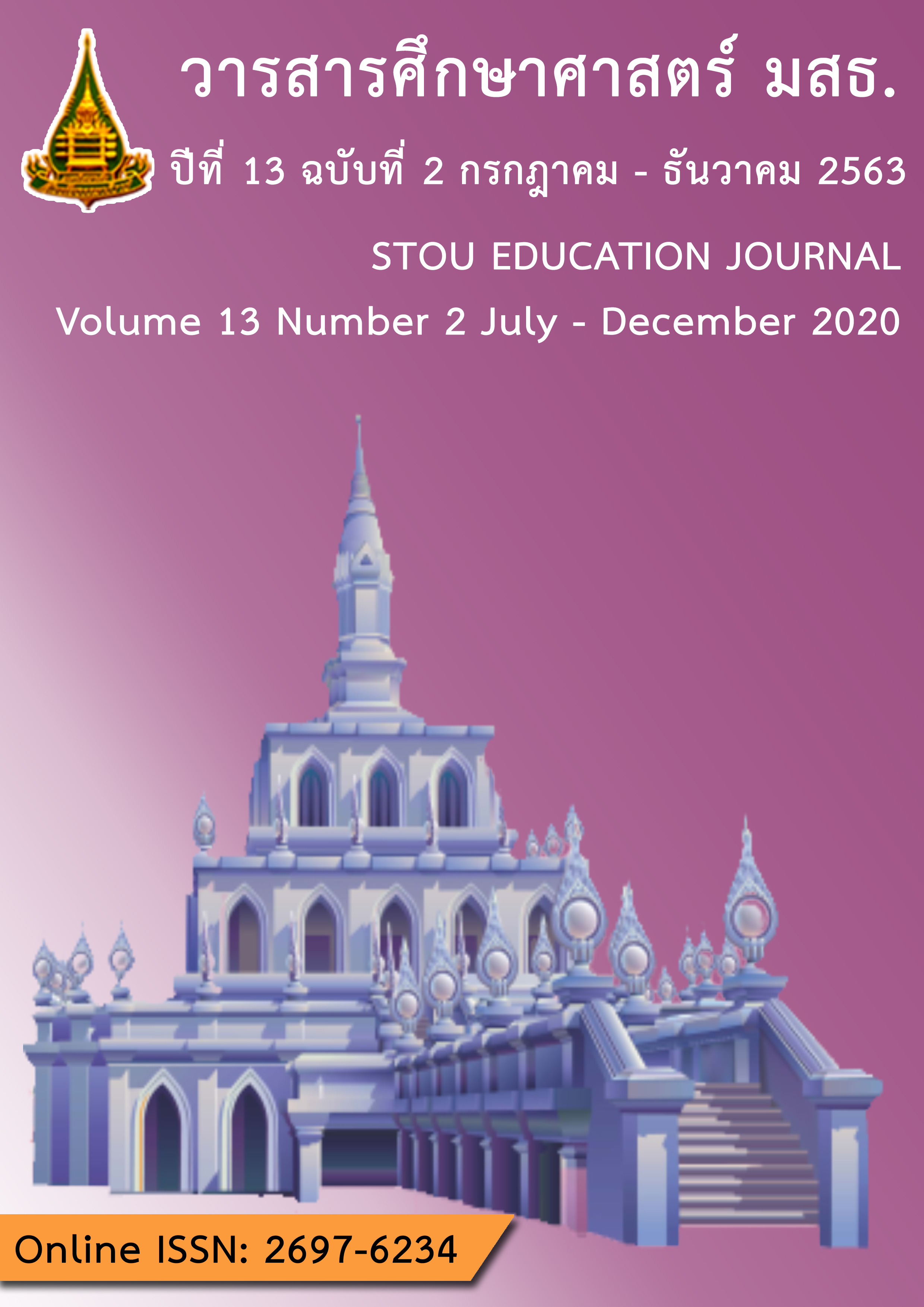The Systematic Literature Review and Research Synthesis on the Development of Moral Reasoning by Using Socioscientific Issues Approach in Science Teaching
Main Article Content
Abstract
This article aimed to systematically review and synthesize research findings on moral reasoning development using the socioscientific issues approach (SSI) in science teaching. It also presented the crucial components of moral reasoning, the meanings, key features, models or teaching approaches using socioscientific issues. Twelve high-quality research papers were selected by a qualitative screening method. The research findings were synthesized through thoughtful reading, interpreting, searching for essential keywords, identifying emerging research patterns and themes using a comparative method. The synthesis of research indicated that SSI could develop students' moral reasoning in many areas, namely using more formal language, considering long-term effects, having more diverse viewpoints, and avoiding using emotion and instinct in giving reasons. The social issues used in teaching to promote students' moral reasoning should be interesting, controversial, inconclusive, and touching students' minds. These issues were divided into 2 groups: genetic engineering and medical issues, and environmental issues. The factors affecting moral reasoning development included the students' context, such as socio-economic status, religious values, cultural beliefs, classroom environment, and scientific knowledge.
Article Details
References
สำนักงานคณะกรรมการการศึกษาขั้นพื้นฐาน กระทรวงศึกษาธิการ. (2560). มาตรฐานการเรียนรู้และตัวชี้วัด กลุ่มสาระการเรียนรู้คณิตศาสตร์ วิทยาศาสตร์ และสาระภูมิศาสตร์ ในกลุ่มสาระการเรียนรู้สังคมศึกษา ศาสนา และวัฒนธรรม (ฉบับปรับปรุง พ.ศ. 2560) ตามหลักสูตรแกนกลางการศึกษาขั้นพื้นฐาน พุทธศักราช 2551. กรุงเทพมหานคร: โรงพิมพ์ชุมนุมสหกรณ์การเกษตรแห่งประเทศไทย.
Berne, B. (2014). Progression in ethical reasoning when addressing socio-scientific issues in biotechnology. International Journal of Science Education, 36(17), 2958–2977.
Bucciarelli, M., Khemlani, S., & Johnson-Laird, P. N. (2008). The psychology of moral reasoning. Judgment and Decision Making, 3(2), 121-139.
Fowler, S. R., Zeidler, D. L., & Sadler, T. D. (2009). Moral sensitivity in the context of socioscientific issues in high school science students. International Journal of Science Education, 31(2), 279-296.
Greene, J. D., Morelli, S. A., Lowenberg, K., Nystrom, L. E., & Cohen, J. D. (2008). Cognitive load selectively interferes with utilitarian moral judgment. Cognition, 107(3), 1144-1154.
Gutierez, S. B. (2015). Integrating socio-scientific issues to enhance the bioethical decision-making skills of high school students. International Education Studies, 8(1), 142-151.
Haidt, J. (2001). The emotional dog and its rational tail: A social intuitionist approach to moral judgment. Psychological Review, 108(4), 814-834.
Jafari, M., & Meisert, A. (2019). Activating students’ argumentative resources on socioscientific issues by indirectly instructed reasoning and negotiation processes. Research in Science Education (Advance online publication). Retrieved from https://doi.org/10.1007/s11165-019-09869-x
Jones, A., McKim, A., Reiss, M., Ryan, B., Buntting, C., Sauders, K., . . . Conner, L. (2007). Research and development of classroom-based resources for bioethics education in New Zealand: Final report. New Zealand: University of Waikato.
Karahan, E., & Roehrig, G. (2017). Secondary school students’ understanding of science and their socioscientific reasoning. Research in Science Education, 47(1), 755-782.
Lee, H., Chang, H., Choi, K., Kim, S.-W., & Zeidler, D. L. (2012). Developing character and values for global citizens: Analysis of pre-service science teachers’ moral reasoning on socioscientific issues. International Journal of Science Education, 34(6), 925–953.
Lee, H., Yoo, J., Choi, K., Kim, S.-W., Krajcik, K., Herman, B. C., & Zeidler, D. L. (2013). Socioscientific issues as a vehicle for promoting character and values for global citizens. International Journal of Science Education, 35(12), 2079–2113.
Lee, Y. C., & Grace, M. (2012). Students’ reasoning and decision making about a socioscientific issue: A cross-context comparison. Science Education, 96(5), 787-807.
Lewis, S. E. (2003). Issue-based teaching in science education. Retrieved from http://www.actionbioscience.org/education/lewis.html?print
Marks, R., & Eilks, I. (2009). Promoting scientific literacy using a socio-critical and problem-oriented approach to chemistry teaching: concept, examples, experiences. International Journal of Science and Environmental Education, 4(2), 131-145.
Rest, J., Bebeau, M., & Volker, J. (1986). An overview of the psychology of morality. New York: Praeger.
Sadler, T. D. (2004). Informal reasoning regarding socioscientific issues: A critical review of research. Journal of Research in Science Teaching, 41, 513-536.
Sadler, T. D., & Fowler, S. R. (2006). A threshold model of content knowledge transfer for socioscientific argumentation. Science Education, 90, 986-1004.
Sadler, T. D., & Zeidler, D. L. (2004). The morality of socioscientific issues: Construal and resolution of genetic engineering dilemmas. Science Education, 88, 4-27.
Sadler, T. D., Amirshokoohi, A., Kazempour, M., & Allspaw, K. M. (2006). Socioscience and ethics in science classrooms: Teacher perspectives and strategies. Journal of Research in Science Teaching, 43, 353-376.
Sadler, T. D., Romine, W. L., & Topçu, M. S. (2016). Learning science content through socio-scientific issues-based instruction: a multi-level assessment study. International Journal of Science Education, 38(10), 1622-1635.
Saunders, K. J., & Rennie, L. J. (2013). A pedagogical model for ethical inquiry into socioscientific issues in science. Research in Science Education, 43(1), 253-274.
Simonneaux, L. (2001). Role-play or debate to promote students' argumentation and argumentation and animal transgenesis. International Journal of Science Education, 23(9), 903-927.
Stern, P. C., Dietz, T., & Black, J. S. (1985). Support for environmental protection: The role of moral norms. Population and Environment, 8, 204-222.
Yap, S. F. (2014). Beliefs, values, ethics and moral reasoning in socio-scientific education. Issues in Educational Research, 24(3), 299-319.
Zeidler, D. L., Sadler, T. D., Applebaum, S., & Callahan, B. E. (2009). Advancing reflective judgment through socioscientific issues. Journal of Research in Science Teaching, 46(1), 74-101.


